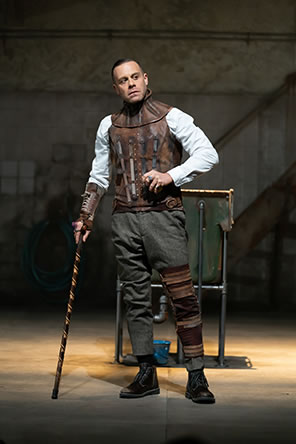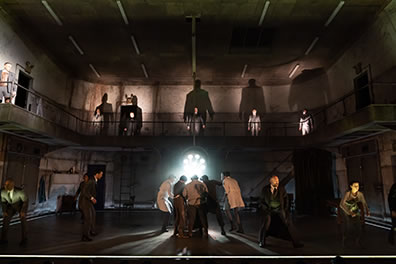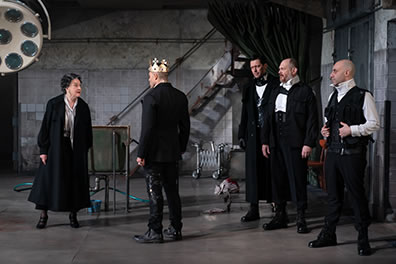Richard III
The Tortured Path to Redemption
Shakespeare Theater Company, Sidney Harman Hall, Washington, D.C.
Monday, February 11, 2019, S–2&4 (back of stalls)
Directed by David Muse

Matthew Rauch speaks his opening soliloquy as Richard, Duke of Gloucester, soon to be the title character of William Shakespeare's Richard III in Shakespeare Theatre Company's production. Photo by Scott Suchman, Shakespeare Theatre Company.
Uh-oh.
I arrive at this judgment just a few lines into the David Muse–helmed production of William Shakespeare's Richard III at Shakespeare Theatre Company's Sidney Harman Hall in Washington, D.C. A rocky sequence of scenes follow, leaving this Shakesgeek feeling like he is on an intellectual roller coaster of a production trying to find its bearings.
I once attended a roller coaster phobia course, by the way. Psychology Today assigned me, then a trade journalist for the amusement industry, to cover the program at Universal Studios in Orlando, Florida. The company was building its Islands of Adventure theme park which would feature two roller coasters (actually three, as one ride has two "dueling" coasters), a first for the organization and its patrons. So, the park set up a bona fide coaster phobia course to train employees who could then mentor patrons. My attending was more than journalism duty: with a deep fear of heights, I suffered serious coaster phobia myself, an occupational liability I needed to get past. Thanks to what I learned in that course, I went on to ride, with great enthusiasm, some 300-plus thrill rides over the next few years, including unfinished prototypes in manufacturers' parking lots. I even mentored more than a dozen other people to overcome their coaster phobia. One particular lesson in the course stood out: thrill rides are conceived, designed, and built by people who want you to have fun; so, trust them to do their job so you can have fun.
That's a lesson theater audiences in general and Shakespeare purists in particular should take to heart. The worst that can happen is disappointment. The best that can happen is epiphany, as I experience in this Richard III. Muse and his cast use unabashed theatricality in tandem with carefully calibrated performances to build a web of emotional intrigue that pays off with dramatic thrills and ends up in an uplifting vision of community. You just have to trust them to do their jobs.
Muse admits in his program notes that he did more than tweak Shakespeare's text. "I've come to think of it as a pantry of tasty ingredients rather than a perfectly put-together recipe," he writes of Shakespeare's early-in-his-career play. Muse goes on to describe his "fairly radical cut" that includes reordering and changing words, cutting and combining characters, and dropping "many historical references that don't mean much to a modern audience."
His world for this Richard III is a torture chamber. Centerpiece to Scenic Designer Debra Booth's morgue-like set, with concrete and tiles walls, an industrial sink to one side, a garden hose mounted at the back, and lab coats hanging on the walls, is a giant surgical light on a pivoting arm mounted over the middle of the room. Richard's victims are all done to death in various nefarious ways by people wearing lab coats arriving with electrical devices, gas dispensers, and a malmsey-butt. Murell Horton's costumes are vaguely modern and evolve into vaguely gothic with stiff high collars for Richard's court. Richard (Matthew Rauch) wears a tightly bound leather vest from chin to waist (replaced later with gold vest) and knee brace that helps him manage whatever neurological, spasm-causing condition he has.
In his notes, Muse seems to point to a specific context for his production as he describes "a few of Richard's characteristics: He has a compulsive desire to dominate and win; he expects loyalty but is incapable of gratitude; he uses and discards people; he feels entitled; he has no moral compass; he's an expert spinner of news and spreader of misinformation; he's a con artist; he excels at demeaning other people; he is a misogynist; he is a man of inward weakness who projects outward strength. There are many real people in our world whom we wouldn't believe if we saw them on stage as characters in a play." Yet, Muse stresses that he is not tying his production to a specific person or place. "It's generally contemporary, more leather-and-cloth contemporary than plastic." Character identifications and short explanations of historical context are projected on the back wall with each actor's entrance, which seems superfluous except for identifying Lord Stanley (Michael Rudko) as "commander of a large private army."
Ironically, despite the conceptual nature of the staging and the liberties Muse takes with the script, this production comes as close as any I've seen to carrying out Shakespeare's true intention with this play. Richard may be cynical, but Shakespeare wasn't, and Muse's staging mirrors that. He just makes sure we get to that point from the inside out.
Rauch starts the play sitting on the floor in front of the industrial sink. He's bouncing a rubber ball and pretends to throw it at the audience. Then he speaks, "Now is the winter of our discontent made glorious summer by this son of York." Starting your performance with one of Shakespeare's most famous soliloquies is no easy task as familiarity inspires instant judgment on your execution. Rauch connects physically with this audience, but in my notes I scribble, "Opening soliloquy is a bit aimless; just speaking words." In a tradition going back at least to Antony Sher's 1984 Richard on crutches, Rauch reveals his cane and gets to his feet with great difficulty on the line, "But I, that am not shaped for sportive tricks…" His disability is not one we can readily diagnose, even with his difficulty standing and walking, and Rauch is inconsistent in his performance of that disability throughout the play. I suspect that is intentional. "Richard's image of himself is worse than the one he presents to the world," Muse writes in his notes. Besides, the blocking in this production is notably precise. Richard hugs his brother Clarence on the line "this deep disgrace in brotherhood touches me deeper than you can imagine," turning the embrace so that Rauch's face is visible to the audience and we can see it doesn't touch him at all.
Cody Nickell's arrival as the Duke of Clarence on his way to imprisonment in the Tower kicks the production's energy into fifth gear, where it stays as the actors bandy the verse with conversational urgency. The scene continues with this intensity as Hastings (Derrick Lee Weeden) leaves imprisonment in the Tower. Nor does Shakespeare give Richard much of a break after this. In the play's second scene, Richard woos Lady Anne (Cara Ricketts) over the corpse of her father-in-law, King Henry VI, whom Richard had killed (along with Anne's husband and father). Rauch and Ricketts are electric, but Anne's evolution in this scene—she gives Richard a pendant at the end—doesn't quite track. That may be due to the number of excised lines, those "historical references that don't mean much to a modern audience" but are elemental in Richard's ability to pierce Anne's resolve against him and wear her down.
In the very next moment, Rauch lifts the production onto his not-at-all-crookbacked shoulders. "Was ever woman in this humor wooed?" he says, stunned. "Was ever woman in this humor won?" He is as triumphant as the Cleveland Browns would be beating the New England Patriots for the AFC Championship. Rauch's Richard, who has grafted the audience to his mind by now, displays genuine incredulity at his awesome powers. "I do mistake my person all this while," he says, Rauch delivering the line as truthful assessment. This is a key point in Richard's arc. Sure, he's already laid plots and inductions dangerous, but now that he's won over Lady Anne against all odds, he's confident he can do anything he wants.
Ricketts gets her moment when Anne approaches the Tower to visit the princes and meets Queen Elizabeth (Robynn Rodriguez) and the Duchess of York (Sandra Shipley) also visiting the children. As Anne learns she is about to be crowned queen, she erupts in the same spirited angst she displays in the early portion of her wooing scene with Richard. This is the first time in 20 productions I've seen that I recall Anne in this scene replicating the Anne we see in Act I, Scene 2. Ricketts here is not reduced to the soulless shell or timid wife I normally see in this scene. Shakespeare doesn't show us Anne in the interim, so nothing textual indicates her personality has diminished, and her language in this scene is as full of bile and frustration as her first scene, as Ricketts demonstrates, only this time it's directed at herself.
This portrayal of Anne is one of several refreshingly new takes on characters in this production. Catesby (John Keabler), identified as "loyal aide to the Yorks" on the projected caption, displays his loyalty from the start with his careful attention to King Edward IV (David Bishins). This Catesby has a conscience, however, and while duty requires that he serve Richard, he does so with an obviously troubled nature, looking to others for like-minded hesitation and finding none. This may be an unusual reading for the character, but it has textual merit in Richard's impatience with Catesby later in the play. Charlie Niccolini plays Prince Edward as a boy in his early teens wearing a white royal military uniform and already bearing himself as king (which, in fact, he is). The juxtaposition with Richard's bonhomie attitude in this scene is noticeable. After young York (Logan Matthew Baker) says he doesn't want to reside in the Tower because he fears his uncle Clarence's "angry ghost," Prince Edward says, "I fear no uncles dead." "Nor none that live, I hope," Richard says with a slight smirk in his tone. "An if they live, I hope I need not fear," Edward replies in a royal steel tone that freezes Richard. Buckingham (Christopher Michael McFarland) in his rumpled business suit is more of an effective bureaucrat than polished politician, but his wonky explanations are what make him so persuasive to the Archbishop (Harry A. Winter), Catesby, and the Mayor of London (Sofiya Cheyenne).
Queen Margaret, on the other hand, has no subtlety whatsoever. Lizan Mitchell speaks her lines with an evangelist preacher's fervor, using Shakespeare's rhythms and a pointing finger as powerful tools in delivering curses that even make Richard flinch. Sandra Shipley also turns the Duchess of York, mother to Edward, Clarence, and Richard, into a force of nature. After long containing her consternation toward Richard and withstanding Margaret poking at her psychological wounds, the Duchess explodes when next she sees Richard. "Thou cam'st on earth to make the earth my hell," she roars with the force of 32 years' worth of regret. "Bloody thou art, bloody will be thy end," she tells Richard with hopeful conviction as she exits the play.
Though I bemoan some of Muse's cuts, both small (in Lady Anne's wooing scene) and large (Mitchell's Margaret doesn't get to teach Rodriguez's Elizabeth how to curse), he keeps in a couple of keen scenes often left out of other productions: the scrivener (David Ryan Smith) writing the over-hasty warrant for Hasting's even hastier execution, and Stanley begging King Edward for a stay of execution for his servant right after the king learns of his brother Clarence's execution at his own hands. "Who sued to me for him?" Edward yells at his court, Bishins rattling souls before exiting to his character's own death. Both scenes illustrate a government sliding off its rule of law rails.


Top, cast members carry out choreographed stomps and slaps as one of Richard's victims is tortured on Murell Horton's torture chamber set with Lap Chi Chu's lighting design in the Shakespeare Theatre Company's production of William Shakespeare's Richard III. Above, the Duchess of York (Sandra Shipley, left), castigates her son, Richard (Matthew Rauch) as, from left, a troubled Catesby (John Keabler), Ratcliffe (David Bishins), and Lovel (Sam Midwood) look on. Hastings' head is on the floor in the background. Photos by Scott Suchman, Shakespeare Theatre Company.
Throughout the play, Muse injects some peripheral stage business with ominous overtones beginning in the first scene. As Richard is talking to Hastings, two men enter at the back, put on lab coats, and begin sharpening knives, swiping the blades with a "schwingggg" on key lines. In subsequent scenes, thugs popping leather straps join the knife-whetting technicians. In time, actors—many still outfitted as the characters they played in earlier scenes—are populating the edges of the stage, banging sticks, stomping, and slapping themselves in choreographed unison. What seems to be indulgent theatricality threatens to take over the play; that it does is part of the production's moral.
Then there's the torture and murders of Richard's victims, which some certainly see as disturbingly excessive extratextual staging (seated at the back of the theater for this opening night performance, we noted the number of empty seats after intermission). However, this device pays off richly when the ghosts of Richard's tortured souls come back to haunt him on the eve of the Battle of Bosworth. Cody's Clarence is the first to appear (no Henry VI ghost), walking on stage, but other ghosts come out from within the torture chambers. Elizabeth's brothers, Rivers (Todd Scofield) and Gray (Jonathan Feuer), enter lying on morgue shelves that slide out from opposite walls. The princes are hanging from a contraption that rolls forward from the back wall and, hoisted thus, they deliver their "despair and die" invocation.
Richard has been sleeping in front of the sink, and when he awakes, he sits up and begins his final soliloquy in the same place and position that he delivered his play-opening soliloquy. This time, Rauch is digging deep into his psyche to try to fully understand what he's become, still engaging the audience as his counsel even at this most self-reflective of moments. Given the bookend nature of this soliloquy with the opening, I look back and wonder if Richard really was bored and mentally listless during the "piping time of peace," and his astonishing victory over Lady Anne was what really unleashed his evil id.
We've already met the woman who will be his ultimate downfall. The Earl of Richmond is played by Evelyn Spahr, and whether the role is regendered (as the Lady Mayor is) or not, Spahr doesn't do anything to disguise her femininity. Richmond and her army are wearing simple military fatigues, and her demeanor is ever upbeat and caring. During the Battle of Bosworth, the rest of the cast has become stick-pounding, foot-stomping, hand-slapping bystanders, and they close in from the edges on the unhorsed Richard to create a wall behind which Richmond triumphs (though we don't see the actual killing). As Stanley crowns Richmond, Spahr comes to the front of the stage and delivers the play's final speech directly to the audience. "Now civil wounds are stopped, peace lives again: That she may long live here, God say 'Amen'!" and with a single loud pound of the sticks, the entire cast turns to face us.
Our feeling of joyful release is what Shakespeare was after in closing out his War of the Roses tetralogy with Richmond founding the Tudor dynasty under which Shakespeare lived in a prospering England. Read what you will into the particulars of Muse's staging—that misogyny unleashes Richard's evil id, that warring of conscience and complicity in his administration, that a woman leads the way to his defeat, that the victims of his torture chamber forge a community of ultimate resistance to the tyrant—the essence of this final moment is the palpable energy running through the audience. We have been thoroughly entertained, particularly by the character of Richard III, but we're psychologically relieved to have reached the end of this thrill ride.
Eric Minton
February 15, 2019
Comment: e-mail [email protected]
Start a discussion in the Bardroom



 Find additional Shakespeareances
Find additional Shakespeareances